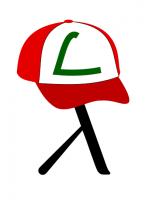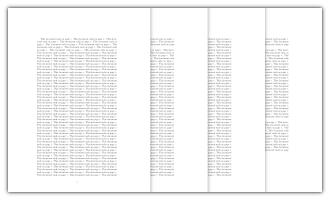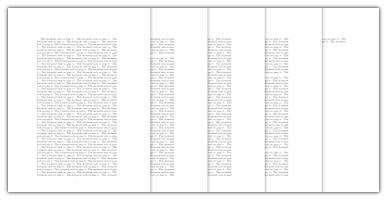Blog
2019-09-15
Today, I wrote this LaTeΧ document.
It only uses default LaTeΧ functionality, and uses no packages.
If you compile it (twice so that cross references are not ??s), you will get a four page document (pages numbered i to iv), that repeatedly says:
"This document ends on page v."
If you then recompile it, you will get a five page document (pages numbered i to v), that repeatedly says:
"This document ends on page iv."
Repeatedly compiling it will alternately give these two results, and so the process of compiling this LaTeX document does not converge.
(Click on one of these icons to react to this blog post)
You might also enjoy...
Comments
Comments in green were written by me. Comments in blue were not written by me.
Add a Comment
2019-03-26
I originally wrote this post for The Aperiodical.
A few months ago, Adam Townsend went to lunch and had a conversation. I wasn't there, but I imagine the conversation went something like this:

Adam: Hello.Smitha: Hello.Adam: How are you?Smitha: Not bad. I've had a funny idea, actually.Adam: Yes?Smitha: You know how the \hat command in LaTeΧ puts a caret above a letter?... Well I was thinking it would be funny if someone made a package that made the \hat command put a picture of an actual hat on the symbol instead?Adam: (After a few hours of laughter.) I'll see what my flatmate is up to this weekend...Jeff: What on Earth are you two talking about?!

As anyone who has been anywhere near maths at a university in the last ∞ years will be able to tell you,
LaTeΧ is a piece of maths typesetting software. It's a bit like a version of Word that runs in terminal and makes PDFs with really
pretty equations.
By default, LaTeΧ can't do very much, but features can easily added by importing packages: importing the graphicsx
package allows you to put images in your PDF; importing geometry allows you to easily change the page margins; and importing
realhats makes the \hat command put real hats above symbols.
Changing the behaviour of \hat
By default, the LaTeΧ command \hat puts a pointy "hat" above a symbol:
After Adam's conversation, we had a go at redefining the \hat command by putting the following
at the top of our LaTeΧ file.
LaTeΧ
\renewcommand{\hat}[1]{% We put our new definition here
}
After a fair amount of fiddling with the code, we eventually got it to produce the following result:
We were now ready to put our code into a package so others could use it.
How to write a package
A LaTeΧ package is made up of:
- a sty file, containing a collection of commands like the one we wrote above;
- a PDF of documentation showing users how to use your package;
- a README file with a basic description of your package.
It's quite common to make the first two of these by making a
dtx file
and an ins file. And no, we have
no idea either why these are the file extensions used or why this is supposedly simpler than making a sty file and a PDF.
The ins file says which bits of the dtx should be used to make up the sty file.
Our ins file looks like this:
LaTeΧ
\input{docstrip.tex}\keepsilent
\usedir{tex/latex/realhats}
\preamble
*License goes here*
\endpreamble
\askforoverwritefalse
\generate{
\file{realhats.sty}{\from{realhats.dtx}{realhats}}
}
\endbatchfile
The most important command in this file is \generate: this says that that the file
realhats.sty should be made from the file realhats.dtx
taking all the lines that are marked as part of realhats. The following is part of our dtx file:
LaTeΧ
%\lstinline{realhats} is a package for \LaTeX{} that makes the \lstinline{\hat}%command put real hats on symbols.
%For example, the input \lstinline@\hat{a}=\hat{b}@ will produce the output:
%\[\hat{a}=\hat{b}\]
%To make a vector with a hat, the input \lstinline@\hat{\mathbf{a}}@ produces:
%\[\hat{\mathbf{a}}\]
%
%\iffalse
%<*documentation>
\documentclass{article}
\usepackage{realhats}
\usepackage{doc}
\usepackage{listings}
\title{realhats}
\author{Matthew W.~Scroggs \& Adam K.~Townsend}
\begin{document}
\maketitle
\DocInput{realhats.dtx}
\end{document}
%</documentation>
%\fi
%\iffalse
%<*realhats>
\NeedsTeXFormat{LaTeX2e}
\ProvidesPackage{realhats}[2019/02/02 realhats]
\RequirePackage{amsmath}
\RequirePackage{graphicx}
\RequirePackage{ifthen}
\renewcommand{\hat}[1]{
% We put our new definition here
}
%</realhats>
%\fi
The lines near the end between <*realhats>
and </realhats> will be included in the sty file, as they are marked at part of
realhats.
The rest of this file will make the PDF documentation when the dtx file is compiled.
The command \DocInput tells LaTeΧ to include the dtx again, but with the
%s that make lines into comments removed. In this way all the comments that describe the functionality will end up
in the PDF. The lines that define the package will not be included in the PDF as they are between \iffalse and
\fi.
Writing both the commands and the documentation in the same file like this means that the resulting file is quite a mess, and really quite
ugly. But this is apparently the standard way of writing LaTeΧ packages, so rest assured that it's not just our code that ugly and
confusing.
What to do with your package
Once you've written a package, you'll want to get it out there for other people to use. After all, what's the point of being able to
put real hats on top of symbols if the whole world can't do the same?
First, we put the source code of our package on GitHub, so that Adam and I had an
easy way to both work on the same code. This also allows other LaTeΧ lovers to see the source and contribute to it, although none have
chosen to add anything yet.
Next, we submitted our package to CTAN, the Comprehensive TeΧ Archive Network.
CTAN is an archive of thousands of LaTeΧ packages, and putting realhats there gives LaTeΧ users
everywhere easy access to real hats. Within days of being added to CTAN, realhats was added (with no work by us)
to MikTeX and TeX Live
to allow anyone using these LaTeΧ distributions to seemlessly install it as soon as it is needed.
We figured that the packaged needed a website too, so we made one. We also figured that the website
should look as horrid as possible.
How to use realhats
So if you want to end fake hats and put real hats on top of your symbols, you can simply write \usepackage{realhats}
at the top of your LaTeΧ file.

realhats: gotta put them all in academic papers
(Click on one of these icons to react to this blog post)
You might also enjoy...
Comments
Comments in green were written by me. Comments in blue were not written by me.
I am a pensioner studying maths with OU. Currently doing M248 stats module. My enjoyment of MLEs has been magnified by your wonderful realhats package. It's a good job I'm 99% tee-total or my tutor would be getting a dubious assignment (still leaves a 1% chance of malt-driven mischief though).
Dave
Add a Comment








